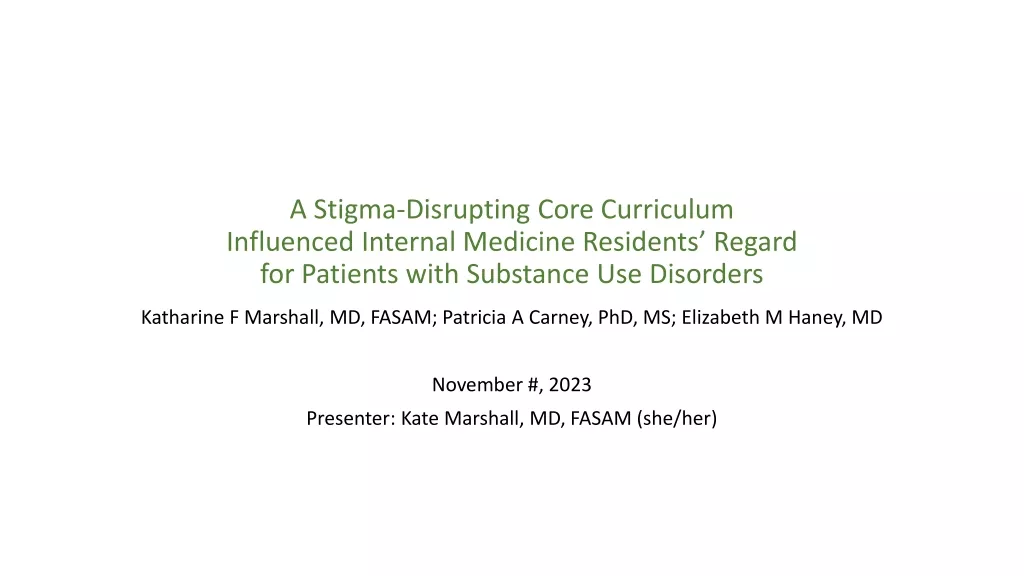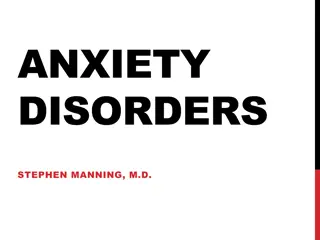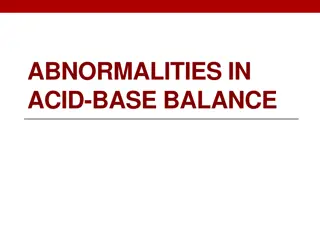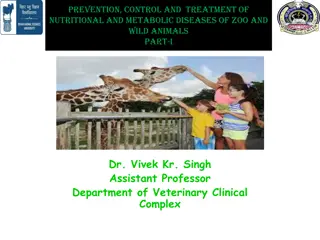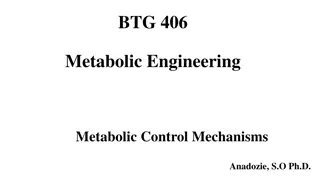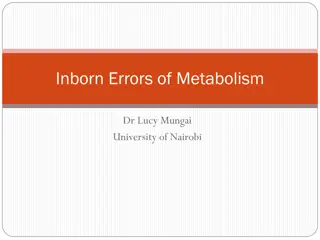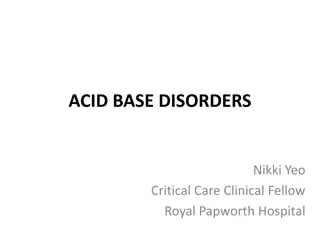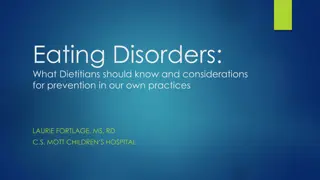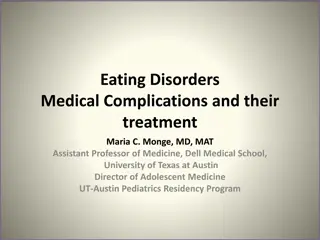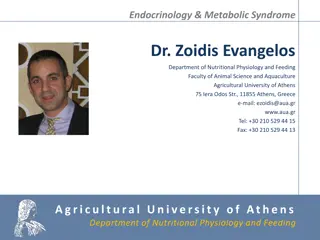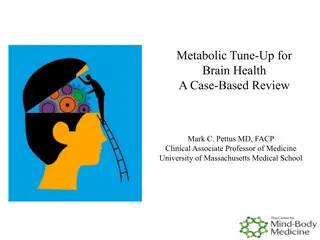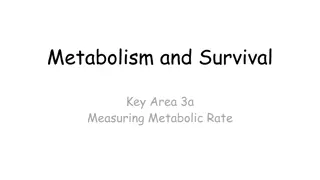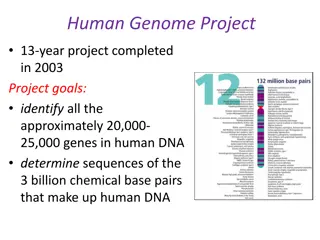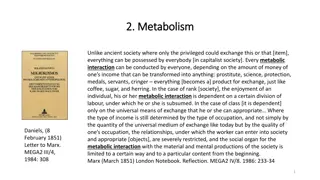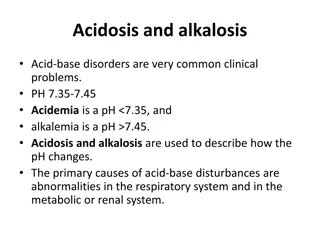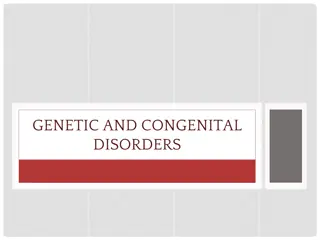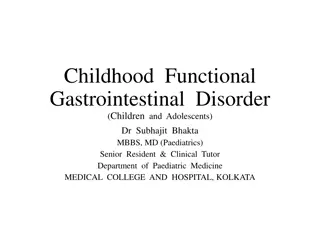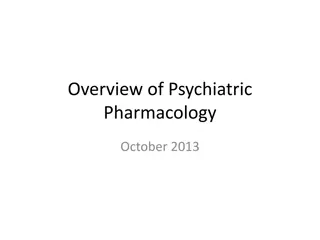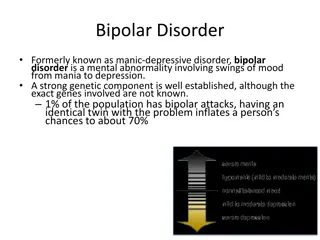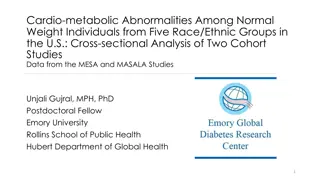Gynecological disorders
Common gynecological disorders including menstrual disorders and abnormal uterine bleeding. Find out about the nursing role in diagnosing and treating these disorders.
3 views • 22 slides
Understanding Steatotic Liver Disease: Importance, Epidemiology, and Pathology
Steatotic liver disease, including metabolic dysfunction associated steatohepatitis (MASLD) and metabolic associated alcoholic liver disease (MALD), is a common cause of liver test abnormalities in the United States. Risk factors such as obesity and metabolic syndrome can lead to advanced fibrosis a
2 views • 44 slides
Enhancing Internal Medicine Residents' Approach to Patients with Substance Use Disorders
This study focuses on developing and implementing a stigma-disrupting curriculum to improve internal medicine residents' attitudes and knowledge regarding patients with substance use disorders. By addressing provider stigma and enhancing preparedness, the aim is to promote positive regard and increa
1 views • 27 slides
Exploring Mental Health Categories and Disorders
In today's categories, we delve into themes like stigma, recovery, myths, and facts surrounding mental health. We discuss various disorders including psychotic disorders and observable signs like hallucinations, delusions, and flat affect. Discover the signs and symptoms of mood disorders and high/l
1 views • 71 slides
Overview of Human Genetic Disorders
Human genetic disorders encompass a range of conditions, from recessive disorders like cystic fibrosis to dominant disorders such as Huntington's disease. Examples include cystic fibrosis, Huntington's disease, and sickle-cell anemia. Understanding genetic disorders involves research and awareness o
0 views • 10 slides
Understanding Anxiety Disorders in DSM-5
Anxiety disorders encompass a range of conditions, from separation anxiety to social phobia and generalized anxiety disorder. The DSM-5 has re-conceptualized these disorders, grouping OCD in its own category and moving PTSD to trauma-related disorders. Recognizing symptoms and seeking appropriate tr
1 views • 96 slides
Understanding Anxiety Disorders and Related Conditions
Explore the distinguishing features of anxiety disorders such as generalized anxiety disorder, panic disorder, and phobias, along with insights into obsessive-compulsive disorder (OCD) and posttraumatic stress disorder (PTSD). Delve into the impact of conditioning, cognition, and biology on these co
2 views • 46 slides
Overview of Anxiety and Related Disorders
Anxiety disorders, such as PTSD, panic disorders, phobias, agoraphobia, and OCD, are characterized by varying degrees of fear and distress. Anxiety is a normal response to danger, but when it becomes chronic, it can lead to debilitating conditions. PTSD occurs post-trauma, panic disorders involve in
1 views • 42 slides
Understanding Mood Disorders and Assessment in Psychiatry
Mood disorders, such as Major Depressive Disorder and Bipolar Disorder, can significantly impact a person's life. They are characterized by disruptions to functional status and relationships. Assessing these disorders involves examining psychiatric history, medical background, and lab assessments li
0 views • 100 slides
Understanding Acid-Base Balance in Health and Disease
Many critical illnesses can disrupt acid-base balance, indicating underlying diseases or organ damage. Interpretation of disturbances requires analyzing arterial blood gases, plasma electrolytes, and compensatory mechanisms. Acid-base disorders are classified into respiratory acidosis, respiratory a
3 views • 26 slides
Understanding Somatic Symptom Disorders, Conversion Disorders, and Dissociative Disorders
Somatic symptom disorders manifest as physical symptoms without apparent cause, while conversion disorders involve specific physical symptoms incompatible with medical conditions. Illness anxiety disorder involves interpreting normal sensations as disease symptoms. Dissociative disorders lead to a s
1 views • 41 slides
Managing Nutritional and Metabolic Diseases in Zoo and Wild Animals
The prevention, control, and treatment of nutritional and metabolic diseases in zoo and wild animals are essential for maintaining their health. These diseases, such as rickets, osteoporosis, osteomalacia, and fibrous osteodystrophy, can result from imbalances in dietary nutrients and metabolic dera
0 views • 10 slides
Understanding Metabolic Control Mechanisms in Cellular Regulation
Metabolic control mechanisms play a crucial role in maintaining homeostasis within cells by regulating metabolic pathways. This involves finely adjusting the output of pathways in response to external signals, ensuring the proper flux of metabolites to meet cellular needs. Pacemaker enzymes, such as
0 views • 17 slides
Overview of Glycine Metabolism and Its Importance in the Body
Glycine, the simplest amino acid, plays a crucial role in various metabolic pathways in the body. It can be converted to important compounds like pyruvic acid, lactic acid, and creates the one-carbon pool. Glycine is essential for heme synthesis, glutathione formation, purine synthesis, and more. In
8 views • 19 slides
Understanding Inborn Errors of Metabolism and Metabolic Disorders
Inborn Errors of Metabolism (IEM) are genetic disorders that disrupt metabolic pathways, leading to substrate accumulation or product deficiency. These disorders can be classified based on toxic accumulation, protein metabolism, carbohydrate intolerance, lysosomal storage issues, energy production d
0 views • 29 slides
Understanding Co-occurring Mental and Physical Health Conditions
Co-occurring mental and physical health disorders are prevalent and require an integrative multidisciplinary approach for effective assessment and treatment. This holistic approach helps address the complexity of managing multiple disorders in an integrated healthcare setting. Through a multi-direct
1 views • 37 slides
Understanding Acid-Base Disorders in Critical Care
Explore the intricate details of acid-base disorders, including metabolic acidosis with anion gap, high and normal anion gap metabolic acidosis, causes of lactic acidosis, and important considerations like hypoalbuminemia. Learn about the delta ratio and how to interpret it in the context of acid-ba
0 views • 31 slides
Understanding Functional GI Disorders: A Comprehensive Overview
Functional GI disorders encompass a range of conditions affecting the gastrointestinal system, such as irritable bowel syndrome and disorders of the gut-brain interaction. These disorders are characterized by no structural abnormalities but are influenced by factors like motility disturbance, viscer
0 views • 42 slides
Understanding Genetic Disorders and Their Impact on Health
Genetic disorders are caused by abnormalities in genes or chromosomes, leading to various health conditions. Inherited disorders can be passed down from parents to children, affecting physical makeup and processes in the body. In India, there is a high prevalence of genetic disorders, particularly i
1 views • 12 slides
Understanding Metabolic Rate in Biology: Measurement and Importance
Metabolic rate, the energy consumed by an organism in a specific time period, can be measured through heat energy, oxygen consumption, and carbon dioxide release. Various tools like calorimeters and respirometers are used for this purpose. The delivery of oxygen through efficient transport systems i
0 views • 28 slides
Understanding Eating Disorders: Types, Signs, Effects, and Recovery
Eating disorders are mental disorders characterized by unhealthy eating habits and can have severe physical and psychological consequences. This article explores the definition of eating disorders, signs to look out for, different types such as Anorexia Nervosa, Bulimia Nervosa, Pica, and Purging Di
0 views • 10 slides
Understanding Eating Disorders: Insights for Dietitians
Eating disorders are complex neurobiological conditions that are not merely about control or weight management. These disorders can affect individuals of all genders, body sizes, and socioeconomic backgrounds. Dietitians play a crucial role in identifying, assessing, and treating eating disorders, a
0 views • 41 slides
Understanding Eating Disorders: Medical Complications and Treatment
This presentation by Dr. Maria C. Monge covers the common eating disorders in teenage patients, potential medical complications, and the role of the medical team in treatment. It includes definitions of disorders like Anorexia Nervosa, Bulimia Nervosa, and Binge Eating Disorder according to DSM-5 cr
0 views • 60 slides
Metabolic and Mechanical Cost of Sedentary and Physical Activities in Obese Children and Adolescents
A study by Stefano Lazzer, Grace O. Malley, and Michel Vermorel explores the metabolic and mechanical costs of sedentary and physical activities in obese children and adolescents. The research delves into the main components of daily energy expenditure, the contribution of organs and tissues to body
0 views • 12 slides
Dr. Zoidis Evangelos: Endocrinology & Metabolic Syndrome Expert at Agricultural University of Athens
Dr. Zoidis Evangelos is a distinguished professional in the field of endocrinology and metabolic syndrome, currently serving as a Lecturer at the Agricultural University of Athens. With a background in biochemistry and extensive research experience, his work focuses on nutritional physiology, molecu
0 views • 12 slides
Understanding Neurodevelopmental Disorders in Childhood and Adolescence
Neurodevelopmental disorders in childhood and adolescence encompass a range of conditions including intellectual disabilities, communication disorders, autism spectrum disorder, and attention deficit/hyperactivity disorder. These disorders impact cognitive development, adaptive functioning, and comm
0 views • 30 slides
Optimizing Brain Health through Metabolic Tune-Up: A Case-Based Review
Explore the case of a 48-year-old RN facing various health challenges like depression, anxiety, obesity, diabetes, and more. Learn about core metabolic imbalances impacting brain health, personalized lifestyle medicine strategies, and the importance of addressing root causes for a balanced metabolic
0 views • 30 slides
Understanding Sleep Disorders: Classification and Diagnosis
Sleep disorders encompass various conditions affecting sleep patterns and quality. They are classified into categories such as insomnia, sleep-related breathing disorders, central disorders of hypersomnolence, circadian rhythm sleep-wake disorders, parasomnias, and sleep-related movement disorders.
0 views • 32 slides
Understanding Metabolic Rate Measurement Techniques
Metabolic rate, the amount of energy used by the body over time, can be measured in different ways using respirometers and calorimeters. Respirometers measure oxygen uptake, while calorimeters calculate metabolic rate based on heat generated by the organism. Understanding these techniques is essenti
0 views • 13 slides
Understanding Grief and Depressive Disorders: A Comparative Analysis
Grief and depressive disorders share similarities but also have distinct differences. Grief is a universal emotional state following loss, while depressive disorders involve prolonged mood disturbances. The stages of grief include denial, anger, bargaining, depression, and acceptance, with intervent
0 views • 79 slides
Understanding Genetic Disorders and the Human Genome Project
The Human Genome Project, completed in 2003, aimed to identify all human genes and DNA sequences. Genetic disorders, like autosomal disorders and Huntington's disease, can result from mutations at different levels, affecting single genes, chromosomes, or multiple genes. Albinism and cystic fibrosis
0 views • 37 slides
Understanding Abnormal Psychology: Disorders, Symptoms, and Treatments
Explore the world of abnormal psychology through the lens of different disorders like depression, anxiety, and phobias. Learn about the definitions of abnormal behavior, DSM-V classifications, and various types of psychological disorders. Delve into the complexities of mental health conditions such
0 views • 39 slides
Understanding Metabolic Interaction in Society
In a capitalist society, metabolic interactions and exchanges are influenced by one's income and occupation quality. This separation between human existence and nature is emphasized in the relation between wage labor and capital. Marx's writings highlight how labor is essential for the metabolic int
0 views • 6 slides
Overview of Classification of Psychiatric Disorders
Psychiatric disorders are illnesses with various manifestations that impact functioning due to disturbances in biological, social, genetic, and other factors. Two key classification systems, ICD-10 and DSM-5, categorize over 200 types of psychiatric illnesses. The ICD-10 includes categories like org
0 views • 18 slides
Understanding Acidosis and Alkalosis in Acid-Base Disorders
Acid-base disorders, involving acidosis and alkalosis, are common in clinical practice. These conditions are characterized by changes in pH levels, with acidemia (pH < 7.35) and alkalemia (pH > 7.45) representing acidosis and alkalosis, respectively. The primary causes of these imbalances lie within
0 views • 17 slides
Overview of Genetic and Congenital Disorders and Their Causes
Explore the terminology, causes, characteristics, and results of genetic and congenital disorders, as well as the disorders of single-gene inheritance. Learn about autosomal dominant disorders like Marfan Syndrome and Neurofibromatosis. Discover how single-gene disorders are inherited and their impa
0 views • 24 slides
Understanding Childhood Functional Gastrointestinal Disorders
Functional Gastrointestinal Disorders (FGIDs) in children and adolescents are characterized by chronic or recurring symptoms that cannot be fully explained by current structural or biochemical tests. These disorders emphasize the role of normal development in symptom presentation and the lack of evi
0 views • 46 slides
Overview of Psychiatric Pharmacology: A Comprehensive Guide from 2013
This presentation delves into the nuances of psychiatric pharmacology, exploring common psychiatric conditions, historical perspectives on medical treatments, categories of psychiatric medications, and principles of treatment. It also touches on mental illness definitions from DSM-IV-TR and DSM-V, a
0 views • 27 slides
Understanding Mental Health Disorders: Bipolar Disorder, Anxiety Disorders, & More
Exploring various mental health disorders such as Bipolar Disorder, Anxiety Disorders, Generalized Anxiety Disorder, Panic Disorder, and Phobic Disorders. Learn about their symptoms, prevalence, and impacts on individuals' lives.
0 views • 41 slides
Cardio-metabolic Abnormalities Among Normal Weight Individuals: A Cross-sectional Analysis of Race/Ethnicity in the U.S.
Overweight and obesity are known cardio-metabolic risk factors, but this study delves into abnormalities among normal-weight individuals. The research compares data from MESA and MASALA studies, including diverse race/ethnicity groups like White, African American, Hispanic American, Chinese American
1 views • 23 slides


